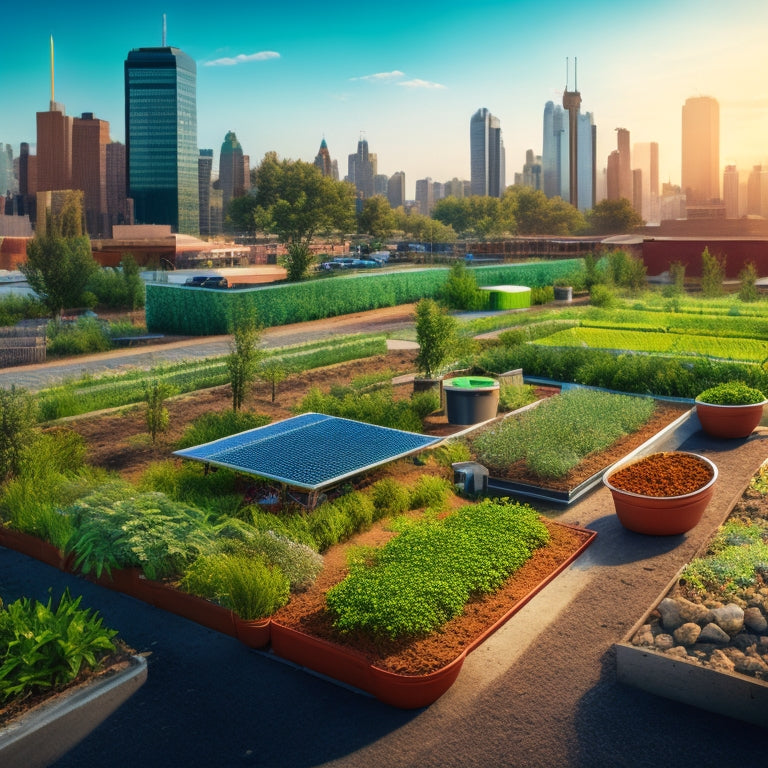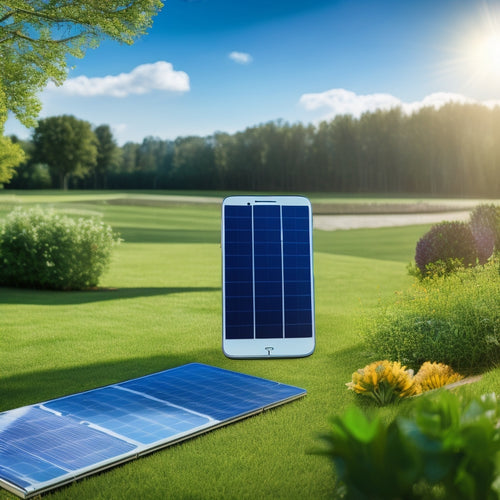
What Urban Farming Tools Maximize Water Efficiency?
Share
By leveraging state-of-the-art tools and techniques, you can greatly enhance water efficiency in urban farming. Soil moisture monitoring systems and smart watering controllers guarantee ideal irrigation schedules, while drip irrigation technology and precise water delivery minimize evaporation and waste. Rainwater harvesting solutions, efficient sprinkler nozzles, and mulching/cover cropping further reduce water consumption. Additionally, grey water management systems and wastewater treatment enable the reuse of water. As you investigate these innovations, you'll uncover even more opportunities to fine-tune your water management strategy and maximize yields while minimizing your environmental impact.
Key Takeaways
- Soil moisture monitoring systems and smart watering controllers optimize irrigation schedules, reducing water waste and ensuring precise water delivery.
- Drip irrigation technology and efficient sprinkler nozzles minimize evaporation and runoff, guaranteeing every drop reaches the plant's root zone.
- Rainwater harvesting systems, including roof catchment systems and storage tank options, conserve potable water and reduce municipal supply reliance.
- Mulching and cover cropping retain soil moisture, suppress weed growth, and regulate soil temperature for better crop health.
- Grey water management systems collect and treat wastewater for reuse, minimizing evaporation, runoff, and overspray in urban farming operations.
Soil Moisture Monitoring Systems
Ideal water usage in urban farming relies heavily on precise soil moisture monitoring, as even slight deviations can greatly impact crop yields and resource allocation. You need to guarantee that your crops receive the right amount of water at the right time.
Regular maintenance, including cleaning solar panel performance, is essential for peak energy efficiency in solar-powered systems, and a similar approach can be applied to soil moisture monitoring.
Soil moisture monitoring systems, equipped with advanced soil sensors, provide you with real-time moisture analytics. This data enables you to adjust your irrigation schedule accordingly, reducing water waste and preventing overwatering.
By implementing a soil moisture monitoring system, you'll be able to maximize water usage, reduce your environmental footprint, and increase crop yields.
With precise monitoring, you'll have the freedom to make informed decisions about your urban farm's water usage, giving you more control over your resources and your harvest.
Drip Irrigation Technology Advantages
You'll find that drip irrigation technology offers several key advantages in urban farming, particularly when it comes to water conservation methods, which reduce the overall water usage in your farm.
By using this technology, you'll also experience reduced evaporation rates, as the water is delivered directly to the roots of the plants, minimizing waste.
Additionally, you'll benefit from precise water delivery, ensuring that each plant receives the exact amount of water it needs, when it needs it.
Furthermore, incorporating renewable energy solutions, such as solar energy implementation, can further enhance water efficiency by powering irrigation systems.
This approach can lead to a more sustainable and environmentally friendly urban farming practice.
Water Conservation Methods
Turn to drip irrigation technology to slash water waste and enhance crop yields. By adopting this method, you'll deliver water directly to the roots of your crops, reducing evaporation and runoff, and minimizing the environmental impact of hazardous waste disposal hazardous waste disposal.
This targeted approach guarantees your plants receive the right amount of water, exactly when they need it. In addition, recycling facilities can benefit from regular maintenance, which can save up to $5,000 annually, extending equipment lifespan and reducing energy consumption.
To additionally maximize water efficiency, consider incorporating rain garden design and xeriscaping techniques into your urban farm. These strategies work in harmony with drip irrigation to minimize water consumption.
Rain gardens capture and filter rainwater, while xeriscaping techniques promote drought-tolerant plants and mulching. By combining these water conservation methods, you'll create a sustainable and thriving urban farm that not only reduces waste but also promotes environmental freedom.
Reduced Evaporation Rates
By adopting drip irrigation technology, you considerably reduce evaporation rates, a key factor in conserving water. This efficient system delivers water directly to the roots, minimizing exposure to air and sunlight, which reduces evaporation. Additionally, evaporation barriers and mulch can be used to further prevent moisture loss.
| Method | Evaporation Rate | Moisture Retention |
|---|---|---|
| Traditional Sprinkler | High (30-40%) | Low |
| Drip Irrigation | Low (10-20%) | High |
| Drip Irrigation with Evaporation Barriers | Very Low (5-10%) | Very High |
Precise Water Delivery
Water delivery precision is a hallmark of drip irrigation technology, which guarantees that every drop reaches its intended destination - the plant's root zone.
As an urban farmer, you'll appreciate the benefits of precise water delivery, which reduces water waste and runoff.
By optimizing your solar panel array design, including tilt, sizing, and orientation, you can enhance energy production and reduce your reliance on non-renewable energy sources Optimize Your Solar Panel Array.
With drip irrigation, you can optimize irrigation scheduling to make certain that your crops receive the right amount of water at the right time.
Regular water audits will help you identify areas for improvement, allowing you to fine-tune your irrigation system for maximum efficiency.
By adopting drip irrigation technology, you'll not only conserve water but also increase crop yields and reduce your environmental footprint.
Rainwater Harvesting Solutions
You'll need to design a thorough rainwater harvesting system to collect and store rainwater efficiently. This starts with a roof catchment system that funnels rainwater into storage tanks, which come in various materials and sizes to suit your urban farm's needs.
By selecting the right filtration methods, you can guarantee the harvested water is clean and suitable for irrigation, reducing your reliance on municipal water supplies.
Implementing renewable energy credits RECs for EV owners can also contribute to a sustainable urban farm by offsetting energy consumption with clean energy.
Roof Catchment Systems
Harvesting rainwater through roof catchment systems offers a highly effective way to conserve potable water, reducing your reliance on municipal supplies and mitigating stormwater runoff.
By integrating roof catchment systems into your urban design, you can promote sustainable design that supports community engagement and climate resilience.
Be certain to research local regulations and participate in education programs to verify your system complies with ordinances.
A well-maintained rooftop garden can also enhance biodiversity and provide economic incentives.
Regular maintenance practices, such as cleaning gutters and downspouts, will keep your system running efficiently.
Storage Tank Options
Selecting the right storage tank is an essential step in rainwater harvesting, as it directly impacts the overall efficiency and effectiveness of your system.
You'll want to evaluate tank materials that are durable, resistant to corrosion, and can withstand outdoor conditions. Popular options include concrete, steel, and polypropylene.
Storage capacity is another critical factor, as it determines how much rainwater you can collect and store for future use. Calculate your tank size based on your roof's surface area, rainfall intensity, and water demand.
Aim for a tank that can hold at least 1,000 gallons to guarantee a steady supply of water for your urban farm.
Filtration Methods Matter
Frequently, urban farmers overlook an essential aspect of rainwater harvesting: filtration. You must consider the type of filtration method to guarantee water quality.
There are various filtration types, including mechanical, biological, and chemical. Mechanical filtration removes debris and sediment, while biological filtration uses microorganisms to break down organic matter. Chemical filtration involves adding chemicals to remove impurities.
Each type offers unique benefits, such as reduced maintenance, improved water clarity, and removal of pollutants. Effective filtration benefits your urban farm by protecting crops from contaminated water, reducing waterborne diseases, and increasing crop yields.
Smart Watering Controllers
By automating irrigation schedules, smart watering controllers optimize water usage and reduce waste in urban farms.
You'll experience significant water savings by leveraging these advanced tools.
With smart controllers, you can:
- Implement automated scheduling, ensuring your crops receive the right amount of water at the right time.
- Make seasonal adjustments, accommodating changes in weather patterns and crop growth.
- Monitor and adjust soil moisture levels, preventing overwatering and underwatering.
Mulching and Cover Cropping
In addition to smart watering controllers, urban farmers can further optimize water efficiency by incorporating mulching and cover cropping into their agricultural practices.
You'll retain soil moisture, suppress weeds, and regulate soil temperature with mulch, which also breaks down into organic amendments.
Cover cropping, a key aspect of crop rotation, adds another layer of water conservation. By planting cover crops in between cash crops, you'll reduce soil evaporation and increase water infiltration.
This approach also enhances soil health, making it more resilient to drought.
Grey Water Management Systems
As you implement mulching and cover cropping, another essential aspect of urban farming to optimize water efficiency is the adoption of grey water management systems.
These systems collect and treat wastewater generated from sinks, showers, and washing machines, allowing you to reuse it for irrigation purposes.
-
Familiarize yourself with local grey water regulations to guarantee compliance with laws and guidelines.
-
Implement a grey water treatment system that removes contaminants and pathogens, making the water safe for your crops.
-
Design your grey water management system to minimize evaporation, runoff, and overspray, guaranteeing maximum water efficiency.
Efficient Sprinkler Nozzles
With efficient grey water management systems in place, it's time to focus on the tools that deliver this precious resource to your crops.
You'll want to select sprinkler nozzles that optimize water distribution and minimize waste. There are various sprinkler types, including impact, gear-driven, and wobbler nozzles, each designed for specific applications.
Nozzle design is critical, as it affects droplet size, path, and uniformity of water distribution. Look for nozzles with a high distribution uniformity (DU) value, indicating even water dispersal.
Additionally, consider nozzles with adjustable flow rates and spray patterns to adapt to changing crop requirements. By choosing the right sprinkler nozzles, you'll guarantee your crops receive the right amount of water, exactly where they need it.
Frequently Asked Questions
Can Urban Farming Be Profitable With High Water Efficiency Measures?
You can achieve urban farming profitability by implementing effective water conservation strategies, such as drip irrigation and mulching, which reduce waste and optimize water usage, ensuring a sustainable and lucrative harvest.
How Do I Choose the Right Water-Efficient Tools for My Farm?
You're aware that 70% of the world's freshwater is used for agriculture, so choosing the right water-efficient tools is essential; to maximize your farm's potential, employ strategic tool selection strategies and investigate innovative irrigation technology options, such as drip irrigation and precision sprinklers.
Are Water-Efficient Tools Compatible With Existing Urban Farm Infrastructure?
You'll need to assess your existing urban farm infrastructure to confirm tool compatibility, evaluating factors like pipe size, water pressure, and electrical capacity to secure seamless integration and ideal water efficiency.
Do Water-Efficient Tools Require Specialized Maintenance or Training?
You might worry that water-efficient tools will break the bank with upkeep costs, but in reality, you'll find that they often require minimal specialized training and only routine maintenance to keep them running at peak performance.
Are There Government Incentives for Adopting Water-Efficient Urban Farming Tools?
You'll be pleased to know that, yes, you can tap into government grants and funding programs to support your shift to water-efficient urban farming tools, allowing you to focus on sustainable practices without breaking the bank.
Related Posts
-

7 Best Geothermal Cooling Systems for Hot Climate Homes
You're evaluating geothermal cooling systems for your hot climate home, and you want to know the top options. Look fo...
-

7 Best Solar Panel Upkeep Apps for Homeowners
You can optimize your solar panel's energy output and efficiency by up to 20% with regular maintenance, which is wher...
-

10 Eco-Friendly Air Management Tools for Clean Home Living
You're taking an essential step towards creating a healthier living space by seeking eco-friendly air management tool...


